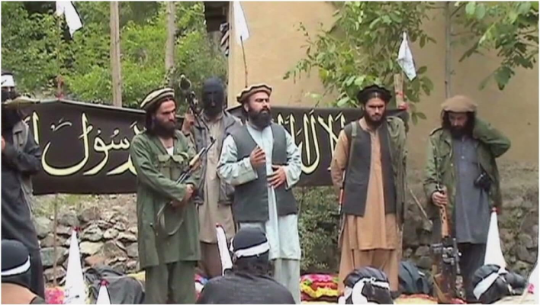Pakistan's Afghan Dilemma
ISA’s creation of Taliban Comes Home to Roost
Salman Rafi Sheikh | 08 July 2021
Pakistan appears to have lost control of the Afghan Taliban, founded in 1994 by its feared Inter-Services Intelligence, known as the ISI, as a proxy to keep India at bay on its northwestern border, raising concerns over its connections to radical organizations seeking to install Islamic law in Pakistan itself.
While Pakistan’s policy towards Afghanistan has mostly been seen in terms of its search for ‘strategic depth’ against an Indian land invasion, the scenario left in the wake of the US withdrawal – and the way it is unfolding as a civil war – has left Islamabad with no major options to shape the Afghan outcome to its own interests.
While Pakistan still seeks to deter an Indian role, it does not have a strong appetite for the Taliban’s return to power along similar lines as the 1990s when a brutal four-year civil war not only brought the group to power but also forced millions of refugees into Pakistan, among other countries, to get away from the Taliban’s ‘Islamic Caliphate.’
In a fiery speech to the parliament last week, Pakistan’s Prime Minister Imran Khan categorically stated that Pakistan “is no longer looking to create a strategic depth’ in Afghanistan. At the same time, while Khan announced that Pakistan wouldn’t give the US new military bases, Pakistan’s foreign office has confirmed that agreements signed in 2001 for providing the US military with ground and land access remain valid and operational, which means Pakistan will still be assisting the US in its post-withdrawal campaign, which is to be managed from a military base in Qatar.
Islamabad tacitly opposes the Taliban as the exclusive managers of Afghanistan to the exclusion of the political elite in Kabul that has been playing a role ever since 2001. Whereas Pakistan’s various officials have been supporting an “Afghan-led and Afghan-owned” political settlement, a recent report of NATO confirmed that Pakistan isn’t looking to bring the Taliban back to power.
The report, by the NATO Defense College titled Regional Powers and Post-NATO Afghanistan said that “Islamabad is against Taliban rule. Pakistan considers a Taliban-dominated or militarily-enforced Taliban regime as not conducive to its national interests for several reasons.” As the report mentions, Pakistan has vital political and economic interests such as trade links with Central Asia that could serve it better in the absence of a civil war.
While Pakistan wants to establish a set-up that does not exclude the Taliban, the report highlights that it has been asking the Taliban to “break ties with the Tehreek-e-Taliban” as means to protect Pakistan from becoming yet again a victim of Afghan violence.
However, as reports indicate, Pakistan hasn’t been particularly successful. As \top security and military officials told the parliament recently, the TTP and the Afghan Taliban are two sides of the same coin. The Taliban’s rise and Pakistan’s flagrant and unqualified support for the group could create many political and security-related problems in the short and long run.
Pakistan’s fears have increased manifold in the wake of the Taliban’s rapid military successes even as the US withdrawal is still happening. The fact that the US decided to withdraw without first facilitating a political deal between Kabul and the Taliban has massively contributed to the loosening of forces that aim to seize control of Kabul through violent means.
Ever since 1973 when Mohammad Daud seized control of Kabul through a coup and declared Afghanistan a republic, the dominant mechanism of political control has been violence. Daud was overthrown and killed in a pro-Soviet coup in 1978, which led to the beginning of brutal infighting leading to the Soviet invasion in 1979. After Soviet withdrawal, Najibullah’s government was overthrown by the Mujahedeen in 1992, which led to a period of four long years of civil war until 1996 when the Taliban seized control of Kabul and imposed a hardline version of Islam.
In 2021, what we are witnessing is a violent repetition of history and Afghanistan’s refusal to shun its path dependency. The Taliban’s rapid and continuing successes since the February 2020 Doha agreement have made them politically too formidable a force to defy external pressures, including those from Pakistan.
In their most recent military successes, the group has successfully penetrated Afghanistan’s northern provinces, including Kunduz. Their expansion from their traditional strongholds in the south to the north shows that the group has already acquired the operational capacity to project its power across and even beyond Afghanistan.
For Pakistan, the Taliban’s growing power does not bode well. It has directly emboldened the TTP. Already, Pakistan’s positive overtures to the US for “durable” post-withdrawal relations have invited strong criticism from the Afghan Taliban. Their criticism has already produced almost a dozen terrorist attacks in the Quetta region of Balochistan, killing a score of paramilitary troops and civilians alike, and putting Pakistan back in the line of fire.
For Pakistan, therefore, violent occupation of Kabul by the Taliban will inevitably throw Afghanistan into a period of civil war followed by massive international pressure on Pakistan to accept more and more Afghan refugees, taking the country back to the 1980s when the arrival of these refugees also inculcated what came to be known as ‘Kalashnikov culture’ and massive drug peddling across Pakistan’s various provinces – Sindh (Karachi), Balochistan and Khyber Pakhtunkhwa (KPK).
Therefore, while Pakistan does want to see a political set-up in Afghanistan which includes the Taliban, there is no appetite for reviving the 1980s, especially when it comes without significant US aid and international support. An exodus of Afghan refugees into Pakistan will, Islamabad thinks, put enormous economic pressure on an economy that is struggling hard to even meet its IMF requirements.
Salman Rafi Sheikh, Writer.
This article was originally published on Asia Sentinel.
Views in this article are author’s own and do not necessarily reflect CGS policy.
